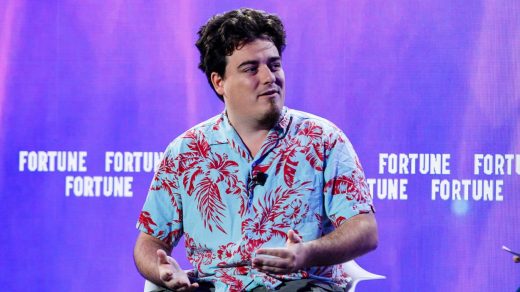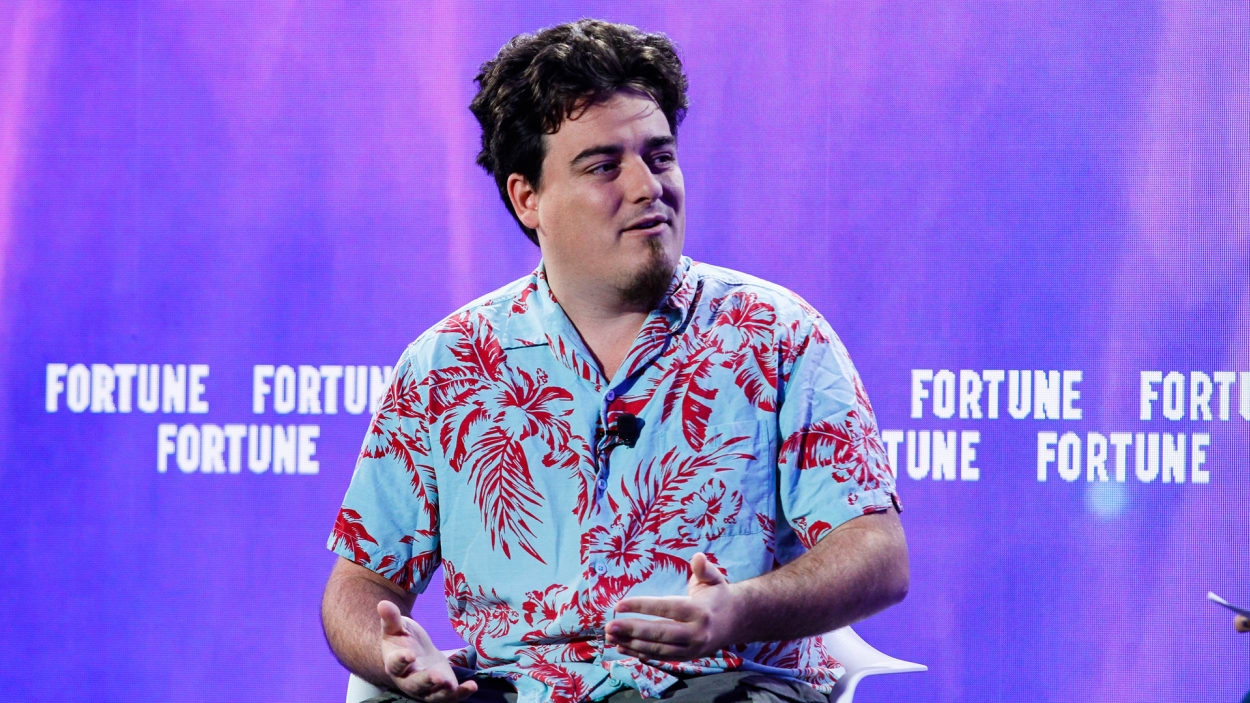Palmer Luckey: The U.S. is falling behind in defense because Big Tech is scared of China
After Palmer Luckey sold his Oculus virtual reality company to Facebook for $2 billion in 2014, he could have easily used the proceeds to start a new AI company that sold chatbots or made movie recommendations. Instead he did something harder: He founded Anduril, which sells AI-powered drone defense systems to the U.S. and its allies.
He says part of his reason for starting Anduril is because the Pentagon was not getting the strategic benefits of having the world’s biggest braintrust of tech innovation within its borders—Silicon Valley.
Luckey spoke at Fortune’s Brainstorm Tech conference in Aspen, Colorado, on Wednesday, and, as usual, he was a fountain of soundbites.
Big Tech companies like Meta, Luckey says, are using their vast wealth, and the world’s top talent, mainly to build tech toys and social apps while ignoring more serious applications like protecting democracies from aggressors.
“We’re deployed in partner nations fighting active aggressors who are trying to destroy their countries,” Luckey said. “And you realize, like if you ‘move fast and break things,’ then people are going to die . . .” he added, referencing Facebook’s one-time rallying cry for building new tech quickly.
He also seemed almost proud that he was terminated by Facebook.
“[W]hen you say my exit from Facebook . . . my employment was terminated,” he told Fortune’s Michal Lev-Ram. “I always note that just because it’s so common for people to hide behind the niceties.”
Luckey said that while the defense market is huge (the U.S. now routinely budgets more than $700 billion for defense), the U.S. tech industry has largely shied away from it, ostensibly because of the red tape involved in selling to the government—and because of the perception that many Silicon Valley workers have idealogical objections to working on defense tech. A group of Google employees famously protested, and some resigned, over the company’s contract to work on the Pentagon’s Project Maven in 2018.
“I think that’s mostly a smokescreen for the real reason” companies stay out of defense, he said, “which is, nobody wants to lose access to Chinese markets, Chinese capital, and Chinese manufacturing—especially companies like Apple that have invested literally hundreds of billions of dollars and will continue to invest hundreds of billions more.”
Luckey had more to say about Apple’s dealings with China. Apple, which began selling into the greater China market in 2010, has taken as much as a quarter of its total revenue there in years past (China accounted for $68 billion in 2021). Most of Apple’s supply chain is in Asia, and nearly all of its manufacturing happens on mainland China.
“You’d think that if anyone could do what they want to do, then [it’s] Apple, the largest company in the country, one of the most powerful entities in the world, more powerful than most nations. . . . ” Luckey said. “[But] they could never do anything that would upset the Chinese Communist Party because, if that happens, [with] 95% of our manufacturing is in China, they are a $2 trillion company that could be wiped out with the stroke of a pen.”
Luckey has long made the case that Silicon Valley isn’t supplying the technology needed to help the U.S. counter forces like the Russians and the Chinese, which are relying on high-tech weapons such as hypersonic missiles and autonomous vehicles to achieve dominance on the battlefields of the future. (He readily acknowledges there are exceptions to the rule, such as Microsoft, which has been a steady partner to the DoD.)
In the absence of Big Tech, you’d expect smaller startup companies to rush in to fill the gap. But, Luckey explained, startups find it difficult to seize the opportunity.
“[I]t’s very hard to raise money; It’s very unpopular with a lot of investors, especially the ESG type investors, which represents $30 trillion in global capital,” he said. “You were in this situation where anyone working on defense was seen as just kind of inherently wrong by enough people that nobody would follow.”
Luckey points out that even though the defense market is huge compared to commercial or consumer tech markets, only two defense startups—Palantir and SpaceX—became unicorns in the 35 years after the end of the Cold War.
Instead, the Pentagon continues to rely on big defense contractors, such as Raytheon and McDonnell Douglas–which are better at building fighter planes and bombs than software–to supply the majority of its technology. The old relationships, and slow pace, are habits that die hard.
“We don’t have the structure and certainly not the incentives from the government to build autonomous systems, robotics, artificial intelligence, artificially intelligent sensors, high-end joint all-domain command and control systems,” Palmer said. “It became clear that that was going to be an important part of the future that we were not building at our major defense primes.” By contrast, China, with its authoritarian system of government, has little trouble sourcing cutting-edge tech from Chinese companies.
Luckey is among the most visible in a group of startup founders, ex-tech CEOs (such as Eric Schmidt), VCs, and government officials trying to find ways of helping the Valley and the Pentagon work together. But in tech circles Luckey has been perceived as a voice in the wilderness—or worse, a proponent of robotic war. That perception, he says, has changed.
“. . . I’ve been invited to way more conferences since Ukraine got invaded—it was like overnight,” Luckey said. “People were shitting on me for like five years, and then all of a sudden, Ukraine got invaded and people who had been shitting on me were like ‘Palmer, you are such an incredible mind on defense; please come and speak.’”
Luckey stressed that he hopes the Ukraine conflict will end soon but said he fears that Americans will forget its lesson—that the U.S. and its allies are falling behind authoritarian regimes when it comes to high-tech war.
“Why did Russia feel like they could get away with this—and why were they right?” he asked.
Luckey believes both the Pentagon and Silicon Valley should face up to the problem of the U.S.’s vulnerability to high-tech, autonomous weaponry.
“[H]opefully after the conflict you could say, ‘Okay, those underlying problems are still there, and I need to work on this before the next invasion’,” he said.
“I’m gonna lose my mind if people stop caring about this, and then Taiwan gets invaded and then everyone has ‘I stand with Taiwan’ Twitter profile pictures.’”
(40)



